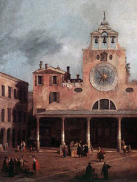What my credit can do in (medieval) Venice
January 2, 2013Mueller, Reinhold C. (1987) I banchi locali a Venezia nel Tardo Medioevo. Studi Storici, 28/1: 145-55.
There is a lot to be admired in Austrian economists, their resilience, their attachment to simple elegant ideas and their sound understanding of the long-term factors that give the economy its cyclical nature. But one must admit that their Ludite-like hatred for finance is to the very least puzzling. They claim to trust nothing but gold and they would like to see the activity of banks restricted to little more than a locker service. Their trust in free market and in the adaptive nature of human ingenuity ends at the door of their local branch of HSBC. Read the rest of this entry »
Lest we forget life
November 11, 2012As the Brits celebrate the young men how have fallen for the crown, numerous touching stories are told in the papers. This one by Caroline Green in The Telegraph caught my eye.
All too often, life is crowded out of war stories. We concentrate on dramatic events such as battles, sieges, the absence of the men at home, the huge traumas when they do march back and other such things but we forget often totally the background. Specially the economic one.
I, for one, was completely stunned when I read this paragraph in the article dedicated to Gordon Eltham (positively dashing young fellow), the writer’s grand father, who had been declared missing presumed dead by White Hall during the First World War:
I have no clue what bank it was but apparently while countries were at war some business kept on as usual and information could still flow back and forth. I wonder if it was still the case during WWII. That would be a story worth telling.
When a giant dies
August 14, 2012Danny Boyle must be an happy fellow. The man who directed the 2012 London Olympics opening ceremony made no mystery of his very critical view of the Industrial Revolution: that dark, unfair, flesh-eating process which brought an insignificant green island to the position of sole world power for almost two centuries. To Danny’s great relief, one of the last remaining monuments of this time has finally succumbed to poor timing, lack of credit and depressed prices.
Stephenson Clarke, the oldest shipping company in the UK, created in 1730, was put in liquidation last week (read article). The Germans and the Taiwanese have taken over. The Greeks too, these old friends of the British navy are among the rare beneficiaries of the dire times most of the industry is sailing through. After having been the main hub of the world’s shipping, Britain is now out of the competition. How does a country loses such a strong advance over its competitors? Rather than silly sabre-rattling about the success of the athletes of team GB, the British would be well-inspired to reflect upon this national catastrophe.
Unlike most of the industries inherited from the Industrial Revolution, shipping is still a viable sector. The problems faced by another grand old British company, Barclays, may shed some light on the causes of the debacle of British shipping. The bank is accused to have practiced what amounts to insider trading on the interbank market, this shows that the city has failed to engage in the financing of British industry. International finance may be more glamorous but it has little impact on the country at large. Boastful Cameron should bear in mind that local country banks, not the city, bankrolled the Industrial Revolution.
The battle of the piggy banks with the money doses
June 14, 2011I didn’t know this piece by Pieter Bruegel. That’s the only interesting thing I got from Niall Ferguson’s BBC series the Ascent of Money. The show’s dismal and often out right inaccurate. Worse, instead of the promise financial history of the world, we get a third rate finance class with, admittedly, historical examples. It’s completely different, in particular there is an idea of evolution through try and error that is absolutely absent from the series. I’d like to see what a real historian like Oscar Gelderblom would have done with it.
The bare necessities will come to you
February 7, 2011… or then again maybe not.
Looking at that table, I wonder if the level beneath but close to 0.5 has any value as such, like minimum purchasing power necessary to survive. OK I should go through the paper, but really Robert Allen is seldom the funniest read ever.
From DJ r.a.c. via MC 2LONG
Finance and gambling in early modern Europe or why Arrow-Debreu can be fun
December 25, 2010Hedge fund managers playing poker and investment gurus using their skills in casinos are part of the contemporary mythology surrounding the world of finance. This makes it surprising that when Merton listed the functions performed by financial markets and institutions he did not include a very important one: entertainment. Had he considered early modern Europe, the striking resemblance between a casino and a stock exchange would certainly not have eluded him.
Ngrams
December 20, 2010OK I haven’t understood how it works yet, but I’m already having a hell lot of fun with Google’s Ngram (thanks Sarah).
View of the world
Saito, O. and T. Settsu: one banker v. seven samurais
December 20, 2010Saito, Osamu and Tokihiko Settsu (2006) Money, credit and Smithian growth in Tokugawa Japan. Hitotsubashi University. Institute of Economic Research. Discussion Paper #139.
In Osaka, Japan’s commercial capital, under the Tokugawa, rich merchants began to add to their functions that of lender to the mighty overlords (daymo) who needed to transform the production of their domain in bullion in order to cover their expenses in Edo and the taxes due to the Shogun (p.2). At the time, the country was segmented in small local capital market and no security was traded over the whole country. Despite those limitations, the rural industries did grow over the period, yet for that they had to have access to some fundings. Where did this capital come from? (p.3)
This wholesaler system arose in replacement of an inexistent banking sector (p.4). However this organization favored greatly the Osaka merchant who managed to impose de facto their service as a necessary precondition to any industrial or agricultural endeavor (p.5). But at that time, local merchants took on Osaka’s oligopoly.
To develop the production and trade of a wealth of proto-industrial products, they started delivering themselves those products to Edo, thus by-passing the Osaka intermediaries. Local lords backed these initiatives, for instance by issuing bank notes (hansatsu) to remedy to the dramatic shortages of money (p.9). However often successful, these initiatives led to a quick segmentation of the Japanese capital market and each of these small areas suffered from high interest rates (more than 18%), while at the same time interest rates in Osaka kept following (p.10).
A system, close to the earlier one arose after the Meiji Revolution, but this time with several commercial cities as the center of the operations instead of Osaka alone (p.13).
Opper S. (1993): the incredible story of the fleeing Dutchmen
December 13, 2010Oppers, Stefan E. (1993) The Interest Rate Effect of Dutch Money in Eighteen-Century Britain. The Journal of Economic History, 53/1: 25-43.
Dutch citizens invested heavily in Britain over the 18th century. Even though the English themselves regarded this phenomenon as a necessary evil, it greatly help the Crown to levy the necessary capital for its expenses over the century (p.28). In the 1740s Dutch financiers in London had become critical for the funding of the government’s deficit. To a large extent it can even be said that the Seven Years War was won thanks to foreign money.



 Posted by Ben
Posted by Ben 










